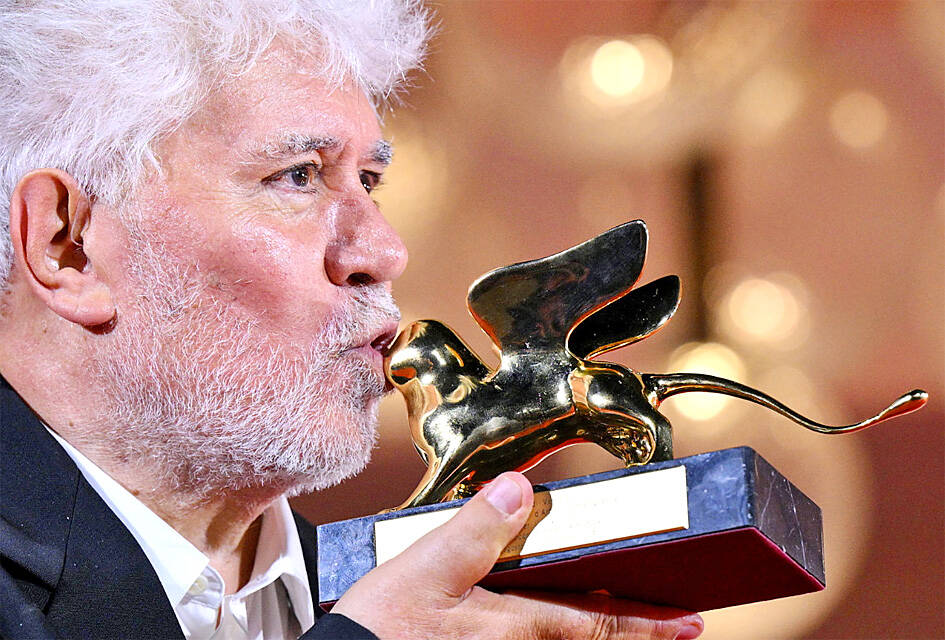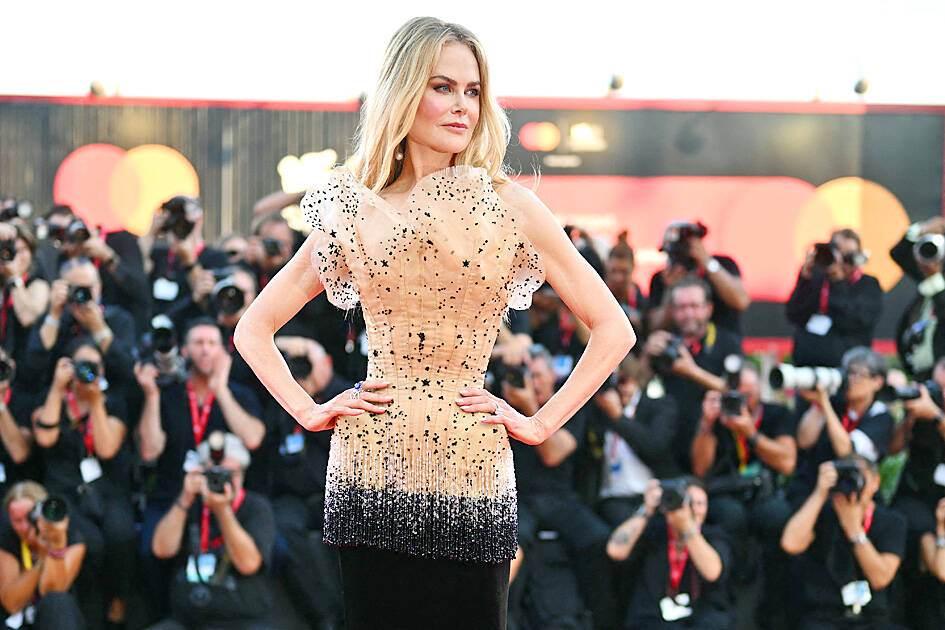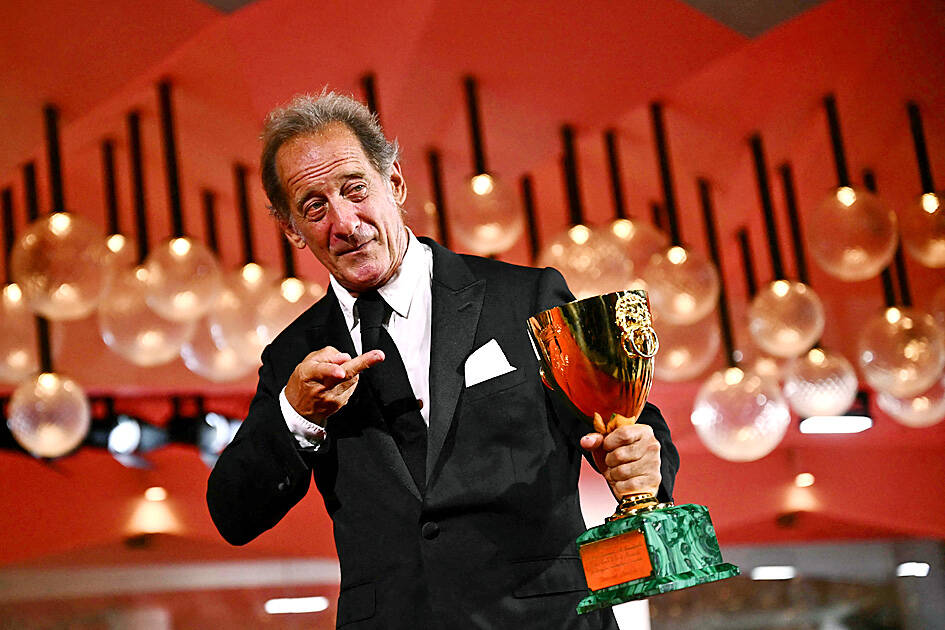“The Room Next Door,” Pedro Almodovar’s English-language debut starring Julianne Moore and Tilda Swinton, topped the Venice Film Festival and was awarded its Golden Lion award Saturday.
Nicole Kidman was awarded the best actress prize, for her raw and exposing portrayal of a CEO embroiled in an affair with an intern in “Babygirl,” but missed the ceremony due to the death of her mother.
“I arrived in Venice and found out shortly after that my beautiful, brave mother, Janelle Ann Kidman has just passed,” Kidman said in a statement read by “Babygirl” director Halina Reijn. “I’m in shock and I have to go to my family, but this award is for her. ... She shaped me and made me.”

Photo:EPA
The 81st edition of the festival came to a close Saturday, with the Isabelle Huppert-led jury bestowing top prizes to Brady Corbet, for directing the 215-minute post-war epic “The Brutalist” and Vincent Lindon, for his lead performance in “The Quiet Son.” Lindon plays a single father whose son is radicalized by the far right.
Maura Delpero’s “Vermiglio” won the Silver Lion award, the runner up prize. The Italian-French-Belgian drama is about the last year of World War II, in which a refugee soldier happens upon a large family.
Almodovar’s win came after his film, a meditation on friendship and death, received a nearly 20-minute standing ovation. The Spanish filmmaker is a Venice favorite, having premiered many of his films at the festival over the past four decades.

Photo : AFP
“I would like to dedicate it to my family,” Almodovar said. “This movie … it is my first movie in English but the spirit is Spanish.”
Corbert, whose “The Brutalist” is about an architect and a Holocaust survivor rebuilding a life in America, came armed with a written statement to read at the ceremony — something his filmmaker wife had encouraged him to do.
“This is all very overwhelming. ... Brevity has never been my strong suit,” Corbet said. “Thank you for not holding its length against me.”

Photo : AFP
The Venice Film Festival used its closing film slot to host the world premiere of Kevin Costner’s “Horizon: An American Saga — Chapter 2.” The film played out of competition.
Many of the 21 competition titles were divisive, with passionate supporters and detractors.
“I have good news for you,” Huppert said at the ceremony. “Cinema is in great shape.”
Among the highest profile of the films of the festival in competition were: Todd Phillips’ “Joker: Folie a Deux,” the not-a-musical-musical with Joaquin Phoenix and Lady Gaga ; Pablo Larrain’s Maria Callas film “Maria,” starring Angelina Jolie as the famed soprano; and Luca Guadagnino’s William S. Burroughs adaptation “Queer,” with Daniel Craig as a junkie expat obsessed with a young student.
Five years ago, the Venice jury surprised the film world by giving the Golden Lion to “Joker,” which went on to win a best actor Oscar for Phoenix. Last year the top award went to “Poor Things” and the year before, the documentary “All the Beauty and the Bloodshed.”
The Luigi De Laurentiis award for a debut film went to Sarah Friedland’s “Familiar Touch,” about an octogenarian’s transition to life in assisted living as she grapples with her age, her memory and her relationship to her caregivers. Friedland also won the director prize in the horizons section and her star, Kathleen Chalfant, won the actress prize.
Though always a player in the international festival scene, Venice has cemented its reputation as a major launching pad for awards campaigns over the past 12 years. Since 2014, they’ve hosted four best picture winners (“Birdman,” “Spotlight,” “The Shape of Water” and “Nomadland”) and 19 nominees. And buzz is already swirling about possible best actress nominations for Kidman and Jolie, actor for Craig and supporting actress for Gaga, as the fall film season kicks into full gear.
The festival this year marked a return to form with true A-listers back on the Lido to celebrate films both in and out of competition after last year’s strike addled outing. In addition to the names above, George Clooney, Brad Pitt, Michael Keaton, Winona Ryder, Ethan Hawke, Sigourney Weaver were all lending their star power to the event.
And many rose to the occasion with their fashion. Gaga’s Christian Dior gown paired with a vintage lace Philip Treacy headpiece made for a major red-carpet moment. As was Kidman’s body hugging Schiaparelli, Blanchett’s Armani Prive with strands of pearls cascading down her back, and Jolie with her fur stole. Rachel Weisz and Daniel Craig also played the power couple, with her in a glittery blue Versace gown and him in a cream Loewe suit. The “Beetlejuice Beetlejuice” cast did also did a spin on the movie’s aesthetic with their wares.

This month the government ordered a one-year block of Xiaohongshu (小紅書) or Rednote, a Chinese social media platform with more than 3 million users in Taiwan. The government pointed to widespread fraud activity on the platform, along with cybersecurity failures. Officials said that they had reached out to the company and asked it to change. However, they received no response. The pro-China parties, the Chinese Nationalist Party (KMT) and Taiwan People’s Party (TPP), immediately swung into action, denouncing the ban as an attack on free speech. This “free speech” claim was then echoed by the People’s Republic of China (PRC),

Exceptions to the rule are sometimes revealing. For a brief few years, there was an emerging ideological split between the Democratic Progressive Party (DPP) and Chinese Nationalist Party (KMT) that appeared to be pushing the DPP in a direction that would be considered more liberal, and the KMT more conservative. In the previous column, “The KMT-DPP’s bureaucrat-led developmental state” (Dec. 11, page 12), we examined how Taiwan’s democratic system developed, and how both the two main parties largely accepted a similar consensus on how Taiwan should be run domestically and did not split along the left-right lines more familiar in

Many people in Taiwan first learned about universal basic income (UBI) — the idea that the government should provide regular, no-strings-attached payments to each citizen — in 2019. While seeking the Democratic nomination for the 2020 US presidential election, Andrew Yang, a politician of Taiwanese descent, said that, if elected, he’d institute a UBI of US$1,000 per month to “get the economic boot off of people’s throats, allowing them to lift their heads up, breathe, and get excited for the future.” His campaign petered out, but the concept of UBI hasn’t gone away. Throughout the industrialized world, there are fears that

Most heroes are remembered for the battles they fought. Taiwan’s Black Bat Squadron is remembered for flying into Chinese airspace 838 times between 1953 and 1967, and for the 148 men whose sacrifice bought the intelligence that kept Taiwan secure. Two-thirds of the squadron died carrying out missions most people wouldn’t learn about for another 40 years. The squadron lost 15 aircraft and 148 crew members over those 14 years, making it the deadliest unit in Taiwan’s military history by casualty rate. They flew at night, often at low altitudes, straight into some of the most heavily defended airspace in Asia.